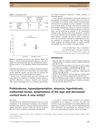
Search
for
Sort by
Research
270-300 / 392 results

research Posters Presented at the 19th Joint Meeting of the International Society of Dermatopathology, March 2–3, 2016, Hilton Crystal City at Washington Reagan National Airport, Arlington, Virginia, USA
The meeting showcased rare skin disease cases, highlighting the need for accurate diagnosis and treatment.

research Teriflunomide Efficacy, Safety, and Tolerability in Patients with Relapsing Forms of Multiple Sclerosis
Teriflunomide is effective and generally safe for treating relapsing multiple sclerosis, reducing relapse rates and disability progression.

research Poikiloderma, Hyperpigmentation, Alopecia, Hypohidrosis, Malformed Bones, Lymphedema of the Legs and Decreased Cortisol Level: A New Entity?
A new medical syndrome may include skin changes, hair loss, sweating issues, bone malformations, leg swelling, and low cortisol.

research Forum
The document concludes that various medications and treatments can have significant, sometimes adverse, effects on health outcomes.

research Adverse Effects and Drug Interactions of Biologic Agents
Biologic agents can be effective for rheumatic diseases but have risks like infections and require careful monitoring and patient information.

research Innovations in Chemotherapy and Radiation Therapy: Implications and Opportunities for the Asia-Pacific Rim
New cancer treatments are more precise and less toxic, improving survival rates, but Asia faces challenges in adopting these advancements.

research Efficacy and Safety of Docetaxel in the Elderly
Docetaxel is safe and works well for older people with cancer, with manageable side effects.

research Abstracts
Finasteride significantly increases scalp hair and prevents hair loss in young and middle-aged men.

research Formestane Preferred as Second-Line Therapy in Advanced Breast Cancer
Formestane is a preferred second-line treatment for advanced breast cancer in postmenopausal women because it's effective and has fewer side effects.

research Cytostatics and Immunosuppressive Drugs: Toxicities and Management
Some cancer and immune system drugs can cause serious side effects, including heart, lung, nerve, and organ damage, which need careful monitoring and management.
research A Case Control Study to Determine the Correlation Between Serum Ferritin Levels and Chronic Telogen Effluvium in a Tertiary Hospital, Mandya
High ferritin levels might be linked to chronic hair loss.

research Commonalities Between COVID-19 and Radiation Injury
Some drugs may help treat both COVID-19 and radiation injury.
research Macrophage Activation Syndrome in a Patient with Systemic Lupus Erythematosus
A patient with lupus experienced a condition where their immune cells became overactive.
research Zinc Deficiency During Total Parenteral Nutrition in Childhood
Long-term TPN in children can cause zinc deficiency, leading to health issues.

research Selective Janus Kinase 1 Inhibition Resolves Inflammation and Restores Hair Growth Offering a Viable Treatment Option for Alopecia Areata
Blocking Janus kinase 1 helps stop inflammation and regrow hair, making it a good treatment for hair loss from alopecia areata.
research Dual Improvement of Alopecia Areata and Immune Thrombocytopenia With Baricitinib: A Case Report
Baricitinib may effectively treat both alopecia areata and immune thrombocytopenia.

research Topical Metformin as a Novel Therapy for Alopecia Areata Due to Its Immunologic Effects
Metformin, usually used for diabetes, can also help treat hair loss from alopecia areata due to its ability to reduce inflammation and stimulate new hair growth.

research Ideal JAK Inhibitor for Alopecia Areata: Baricitinib, Tofacitinib, Ritlecitinib, or Ifidancitinib - Revisiting the Immunomechanisms of the JAK Pathway
No single ideal JAK inhibitor for alopecia areata has been determined; JAK3 inhibitors may be promising with fewer side effects.
research BRAF Inhibitor Dabrafenib in Patients with Metastatic BRAF-Mutant Thyroid Cancer
Dabrafenib was effective and well tolerated in treating thyroid cancer with a specific mutation.

research Adverse Effects Associated with Long-Term Administration of Azole Antifungal Agents
Long-term use of azole antifungals can cause hair loss, hormonal imbalances, and severe skin reactions.
research JAK Inhibitors for Treatment of Alopecia Areata
JAK inhibitors can effectively reverse hair loss in people with alopecia areata.
research The L412F Variant of Toll-Like Receptor 3 Is Associated with Cutaneous Candidiasis, Increased Susceptibility to Cytomegalovirus, and Autoimmunity
The L412F variant of TLR3 is linked to skin infections, more viral infections, and autoimmune issues.
research Teriflunomide: A Once-Daily Oral Medication for the Treatment of Relapsing Forms of Multiple Sclerosis
Teriflunomide effectively reduces relapse rates and disease progression in multiple sclerosis but is not safe for use during pregnancy.
research Cutaneous Toxicity as a Predictive Biomarker for Clinical Outcome in Patients Receiving Anticancer Therapy
Skin reactions from cancer treatments might predict how well the treatments work.

research Tofacitinib (Selective Janus Kinase Inhibitor 1 and 3): A Promising Therapy for the Treatment of Alopecia Areata: A Case Report of Six Patients
Tofacitinib helped regrow hair in patients with alopecia, with few side effects.
research Specificity of Anti-SSB as a Diagnostic Marker for the Classification of Systemic Lupus Erythematosus
Anti-SSB antibodies are useful for diagnosing systemic lupus erythematosus and are linked to specific symptoms.
research Molecular Targeted Agents and Biologic Therapies for Non-Small Cell Lung Cancer
New treatments for non-small cell lung cancer are being tested, with some already in use, focusing on immune response and targeting cancer cells, but side effects vary.
research Open-Label, Randomized, Multicenter, Phase III Study Comparing Oral Paclitaxel Plus Encequidar Versus Intravenous Paclitaxel in Patients With Metastatic Breast Cancer
Oral paclitaxel plus encequidar improved tumor response and caused less neuropathy but more serious infections than intravenous paclitaxel.
research Adverse Reaction to Cetuximab, an Epidermal Growth Factor Receptor Inhibitor
Cetuximab often causes skin problems, but they can be managed without stopping treatment.